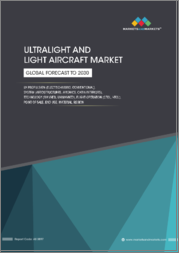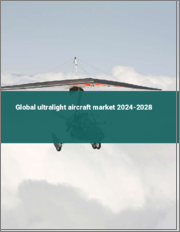
|
시장보고서
상품코드
1754093
초경량 제트기(VLJ) 시장 보고서 : 항공기 유형별, 재료별, 추진별, 최종 용도별, 지역별(2025-2033년)Very Light Jet Market Report by Aircraft Type (Ultra-Light Aircraft, Light Aircraft), Material (Aluminum, Composites, and Others), Propulsion (Electric and Hybrid, Conventional Fuel), End Use (Civil and Commercial, Military), and Region 2025-2033 |
||||||
세계의 초경량 제트기(VLJ) 시장 규모는 2024년에 60억 달러에 달했습니다. 향후 IMARC Group은 시장이 2033년까지 107억 달러에 달하며, 2025-2033년에 6.24%의 성장률(CAGR)을 보일 것으로 예측하고 있습니다.
초경량 제트기(VLJ)는 최대 13,000파운드(5,900kg)의 이륙 중량을 유지할 수 있는 소형 엔트리급 항공기로, 승객 정원이 10명 미만인 항공기입니다. 일반적으로 단일 조종사 전용으로 승인되었으며, 기존 연료 추진 시스템으로 운항됩니다. 그러나 끊임없는 기술 발전으로 하이브리드 및 전기 추진 시스템도 널리 보급되고 있습니다. 이러한 제트기의 주요 장점으로는 비용 효율성과 연료 효율성이 있습니다. 이 외에도 제트기의 무게가 매우 가볍기 때문에 강력한 엔진을 사용하면 비행 시간이 크게 단축되고 노선에 따라 최대 두 배의 속도를 낼 수 있습니다. 초경량 제트기(VLJ)는 비즈니스, 훈련, 여객 운송 솔루션, 군 작전, 상업, 민간 및 군 분야의 조사 및 연구 활동 등 소형 항공 솔루션으로 광범위하게 활용되고 있습니다.
초경량 제트기(VLJ) 시장 동향 :
시장은 주로 민간 항공 솔루션으로의 패러다임 전환에 의해 주도되고 있습니다. 그 배경에는 소비자의 가처분 소득 수준 상승과 부유층(HNW) 증가가 있습니다. 이에 따라 여행 및 관광 산업이 크게 성장하면서 부정기 전세기 수요가 증가하여 시장 성장에 탄력을 받고 있습니다. 또한 고빈도, 단기, 단거리, 근거리 항공편에 대한 수요 증가도 시장 전망을 밝게 하고 있습니다. 이와는 별도로 공중 곡예를 포함한 항공 스포츠의 인기가 높아지면서 제품 보급률 증가에 기여하고 있습니다. 또한 초경량 제트기(VLJ)가 군의 최전선에서 정찰 절차에 빠르게 활용되고 있는 것도 시장을 주도하고 있습니다. 시장에 기여하는 다른 요인으로는 신흥 경제국의 미개발 잠재력, 주요 시장 기업의 광범위한 조사 개발 활동, 항공기 기술의 지속적인 발전 등이 있습니다.
이 보고서에서 다룬 주요 질문
- 세계의 초경량 제트기(VLJ) 시장 규모는?
- 2025-2033년 세계 초경량 제트기(VLJ) 시장의 예상 성장률은?
- 세계의 초경량 제트기(VLJ) 시장을 주도하는 주요 요인은?
- COVID-19가 세계의 초경량 제트기(VLJ) 시장에 미치는 영향은?
- 세계의 초경량 제트기(VLJ) 시장에서의 항공기 유형별 분류는?
- 세계의 초경량 제트기(VLJ) 시장에서의 소재별 분류는?
- 세계의 초경량 제트기(VLJ) 시장내 추진별 시장 현황은?
- 세계의 초경량 제트기(VLJ) 시장의 주요 지역은?
- 세계의 초경량 제트기(VLJ) 시장의 주요 기업은?
목차
제1장 서문
제2장 조사 범위와 조사 방법
- 조사의 목적
- 이해관계자
- 데이터 소스
- 1차 정보
- 2차 정보
- 시장 추정
- 보텀업 어프로치
- 톱다운 어프로치
- 조사 방법
제3장 개요
제4장 서론
- 개요
- 주요 업계 동향
제5장 세계의 초경량 제트기(VLJ) 시장
- 시장 개요
- 시장 실적
- COVID-19의 영향
- 시장 예측
제6장 시장 내역 : 항공기 유형별
- 초경량 항공기
- 경비행기
제7장 시장 내역 : 재료별
- 알루미늄
- 복합재료
- 기타
제8장 시장 내역 : 추진별
- 전기자동차·하이브리드
- 기존형 연료
제9장 시장 내역 : 최종 용도별
- 민간·상업
- 군
제10장 시장 내역 : 지역별
- 북미
- 미국
- 캐나다
- 아시아태평양
- 중국
- 일본
- 인도
- 한국
- 호주
- 인도네시아
- 기타
- 유럽
- 독일
- 프랑스
- 영국
- 이탈리아
- 스페인
- 러시아
- 기타
- 라틴아메리카
- 브라질
- 멕시코
- 기타
- 중동 및 아프리카
- 시장 내역 : 국가별
제11장 SWOT 분석
- 개요
- 강점
- 약점
- 기회
- 위협
제12장 밸류체인 분석
제13장 Porter's Five Forces 분석
- 개요
- 바이어의 교섭력
- 공급 기업의 교섭력
- 경쟁의 정도
- 신규 진출업체의 위협
- 대체품의 위협
제14장 가격 분석
제15장 경쟁 구도
- 시장 구조
- 주요 기업
- 주요 기업의 개요
- Bombardier Inc.
- Cirrus Design Corporation(Aviation Industry Corporation of China)
- Diamond Aircraft Industries(Wanfeng Aviation Industry Co. Ltd.)
- Embraer S.A.
- Honda Aircraft Company(Honda Motor Company)
- Nextant Aerospace
- Pilatus Aircraft Ltd
- Stratos Aircraft Inc.
- Textron Aviation Inc.
The global very light jet market size reached USD 6.0 Billion in 2024. Looking forward, IMARC Group expects the market to reach USD 10.7 Billion by 2033, exhibiting a growth rate (CAGR) of 6.24% during 2025-2033.
Very light jet is a compact, entry-level aircraft that can sustain up to 13,000 lbs. or 5,900 kilograms of take-off weight, with a seating capacity of fewer than ten passengers. Typically approved for single-pilot operation, these jets are operated through a conventional fuel propulsion system. However, with continual technological advancements, hybrid or electric propulsion systems are also gaining traction. Some of the major advantages provided by these jets include cost-effectiveness and fuel efficiency. Besides this, since the jets are very light in weight, the flying duration is greatly shortened with a strong engine and up to twice as fast on some routes. Very light jets are extensively utilized in compact aviation solutions for business travels, training activities, passenger transportation solutions, military operations, and survey and research activities in the commercial, civil, and military sectors.
Very Light Jet Market Trends:
The market is primarily driven by the paradigm shift towards private aviation solutions. This can be attributed to the inflating disposable income levels of the consumers and the increasing number of high net worth (HNW) individuals. In line with this, considerable growth in the travel and tourism industry, resulting in an augmenting requirement for non-scheduled charter flights, is providing an impetus to the market growth. Moreover, the escalating demand for frequent, short-term, and nearby distance flights are also creating a positive outlook for the market. Apart from this, the rising popularity of air sports, including aerial acrobatics, is contributing to a higher product uptake. The market is further driven by the rapid utilization of very light jets in reconnaissance procedures on the front lines of the military. Some of the other factors contributing to the market include the untapped possibilities in growing economies, extensive research and development (R&D) activities conducted by major market players, and continual advancements in aircraft technologies.
Key Market Segmentation:
Breakup by Aircraft Type:
- Ultra-Light Aircraft
- Light Aircraft
Breakup by Material:
- Aluminum
- Composites
- Others
Breakup by Propulsion:
- Electric and Hybrid
- Conventional Fuel
Breakup by End Use:
- Civil and Commercial
- Military
Breakup by Region:
- North America
- United States
- Canada
- Asia-Pacific
- China
- Japan
- India
- South Korea
- Australia
- Indonesia
- Others
- Europe
- Germany
- France
- United Kingdom
- Italy
- Spain
- Russia
- Others
- Latin America
- Brazil
- Mexico
- Others
- Middle East and Africa
Competitive Landscape:
The competitive landscape of the industry has also been examined along with the profiles of the key players being Bombardier Inc., Cirrus Design Corporation (Aviation Industry Corporation of China), Diamond Aircraft Industries (Wanfeng Aviation Industry Co. Ltd.), Embraer S.A., Honda Aircraft Company (Honda Motor Company), Nextant Aerospace, Pilatus Aircraft Ltd, Stratos Aircraft Inc. and Textron Aviation Inc.
Key Questions Answered in This Report
- 1.How big is the global very light jet market?
- 2.What is the expected growth rate of the global very light jet market during 2025-2033?
- 3.What are the key factors driving the global very light jet market?
- 4.What has been the impact of COVID-19 on the global very light jet market?
- 5.What is the breakup of the global very light jet market based on the aircraft type?
- 6.What is the breakup of the global very light jet market based on the material?
- 7.What is the breakup of the global very light jet market based on propulsion?
- 8.What are the key regions in the global very light jet market?
- 9.Who are the key players/companies in the global very light jet market?
Table of Contents
1 Preface
2 Scope and Methodology
- 2.1 Objectives of the Study
- 2.2 Stakeholders
- 2.3 Data Sources
- 2.3.1 Primary Sources
- 2.3.2 Secondary Sources
- 2.4 Market Estimation
- 2.4.1 Bottom-Up Approach
- 2.4.2 Top-Down Approach
- 2.5 Forecasting Methodology
3 Executive Summary
4 Introduction
- 4.1 Overview
- 4.2 Key Industry Trends
5 Global Very Light Jet Market
- 5.1 Market Overview
- 5.2 Market Performance
- 5.3 Impact of COVID-19
- 5.4 Market Forecast
6 Market Breakup by Aircraft Type
- 6.1 Ultra-Light Aircraft
- 6.1.1 Market Trends
- 6.1.2 Market Forecast
- 6.2 Light Aircraft
- 6.2.1 Market Trends
- 6.2.2 Market Forecast
7 Market Breakup by Material
- 7.1 Aluminum
- 7.1.1 Market Trends
- 7.1.2 Market Forecast
- 7.2 Composites
- 7.2.1 Market Trends
- 7.2.2 Market Forecast
- 7.3 Others
- 7.3.1 Market Trends
- 7.3.2 Market Forecast
8 Market Breakup by Propulsion
- 8.1 Electric and Hybrid
- 8.1.1 Market Trends
- 8.1.2 Market Forecast
- 8.2 Conventional Fuel
- 8.2.1 Market Trends
- 8.2.2 Market Forecast
9 Market Breakup by End Use
- 9.1 Civil and Commercial
- 9.1.1 Market Trends
- 9.1.2 Market Forecast
- 9.2 Military
- 9.2.1 Market Trends
- 9.2.2 Market Forecast
10 Market Breakup by Region
- 10.1 North America
- 10.1.1 United States
- 10.1.1.1 Market Trends
- 10.1.1.2 Market Forecast
- 10.1.2 Canada
- 10.1.2.1 Market Trends
- 10.1.2.2 Market Forecast
- 10.1.1 United States
- 10.2 Asia-Pacific
- 10.2.1 China
- 10.2.1.1 Market Trends
- 10.2.1.2 Market Forecast
- 10.2.2 Japan
- 10.2.2.1 Market Trends
- 10.2.2.2 Market Forecast
- 10.2.3 India
- 10.2.3.1 Market Trends
- 10.2.3.2 Market Forecast
- 10.2.4 South Korea
- 10.2.4.1 Market Trends
- 10.2.4.2 Market Forecast
- 10.2.5 Australia
- 10.2.5.1 Market Trends
- 10.2.5.2 Market Forecast
- 10.2.6 Indonesia
- 10.2.6.1 Market Trends
- 10.2.6.2 Market Forecast
- 10.2.7 Others
- 10.2.7.1 Market Trends
- 10.2.7.2 Market Forecast
- 10.2.1 China
- 10.3 Europe
- 10.3.1 Germany
- 10.3.1.1 Market Trends
- 10.3.1.2 Market Forecast
- 10.3.2 France
- 10.3.2.1 Market Trends
- 10.3.2.2 Market Forecast
- 10.3.3 United Kingdom
- 10.3.3.1 Market Trends
- 10.3.3.2 Market Forecast
- 10.3.4 Italy
- 10.3.4.1 Market Trends
- 10.3.4.2 Market Forecast
- 10.3.5 Spain
- 10.3.5.1 Market Trends
- 10.3.5.2 Market Forecast
- 10.3.6 Russia
- 10.3.6.1 Market Trends
- 10.3.6.2 Market Forecast
- 10.3.7 Others
- 10.3.7.1 Market Trends
- 10.3.7.2 Market Forecast
- 10.3.1 Germany
- 10.4 Latin America
- 10.4.1 Brazil
- 10.4.1.1 Market Trends
- 10.4.1.2 Market Forecast
- 10.4.2 Mexico
- 10.4.2.1 Market Trends
- 10.4.2.2 Market Forecast
- 10.4.3 Others
- 10.4.3.1 Market Trends
- 10.4.3.2 Market Forecast
- 10.4.1 Brazil
- 10.5 Middle East and Africa
- 10.5.1 Market Trends
- 10.5.2 Market Breakup by Country
- 10.5.3 Market Forecast
11 SWOT Analysis
- 11.1 Overview
- 11.2 Strengths
- 11.3 Weaknesses
- 11.4 Opportunities
- 11.5 Threats
12 Value Chain Analysis
13 Porters Five Forces Analysis
- 13.1 Overview
- 13.2 Bargaining Power of Buyers
- 13.3 Bargaining Power of Suppliers
- 13.4 Degree of Competition
- 13.5 Threat of New Entrants
- 13.6 Threat of Substitutes
14 Price Analysis
15 Competitive Landscape
- 15.1 Market Structure
- 15.2 Key Players
- 15.3 Profiles of Key Players
- 15.3.1 Bombardier Inc.
- 15.3.1.1 Company Overview
- 15.3.1.2 Product Portfolio
- 15.3.1.3 Financials
- 15.3.2 Cirrus Design Corporation (Aviation Industry Corporation of China)
- 15.3.2.1 Company Overview
- 15.3.2.2 Product Portfolio
- 15.3.3 Diamond Aircraft Industries (Wanfeng Aviation Industry Co. Ltd.)
- 15.3.3.1 Company Overview
- 15.3.3.2 Product Portfolio
- 15.3.4 Embraer S.A.
- 15.3.4.1 Company Overview
- 15.3.4.2 Product Portfolio
- 15.3.4.3 Financials
- 15.3.5 Honda Aircraft Company (Honda Motor Company)
- 15.3.5.1 Company Overview
- 15.3.5.2 Product Portfolio
- 15.3.6 Nextant Aerospace
- 15.3.6.1 Company Overview
- 15.3.6.2 Product Portfolio
- 15.3.7 Pilatus Aircraft Ltd
- 15.3.7.1 Company Overview
- 15.3.7.2 Product Portfolio
- 15.3.8 Stratos Aircraft Inc.
- 15.3.8.1 Company Overview
- 15.3.8.2 Product Portfolio
- 15.3.9 Textron Aviation Inc.
- 15.3.9.1 Company Overview
- 15.3.9.2 Product Portfolio
- 15.3.9.3 Financials
- 15.3.1 Bombardier Inc.

















